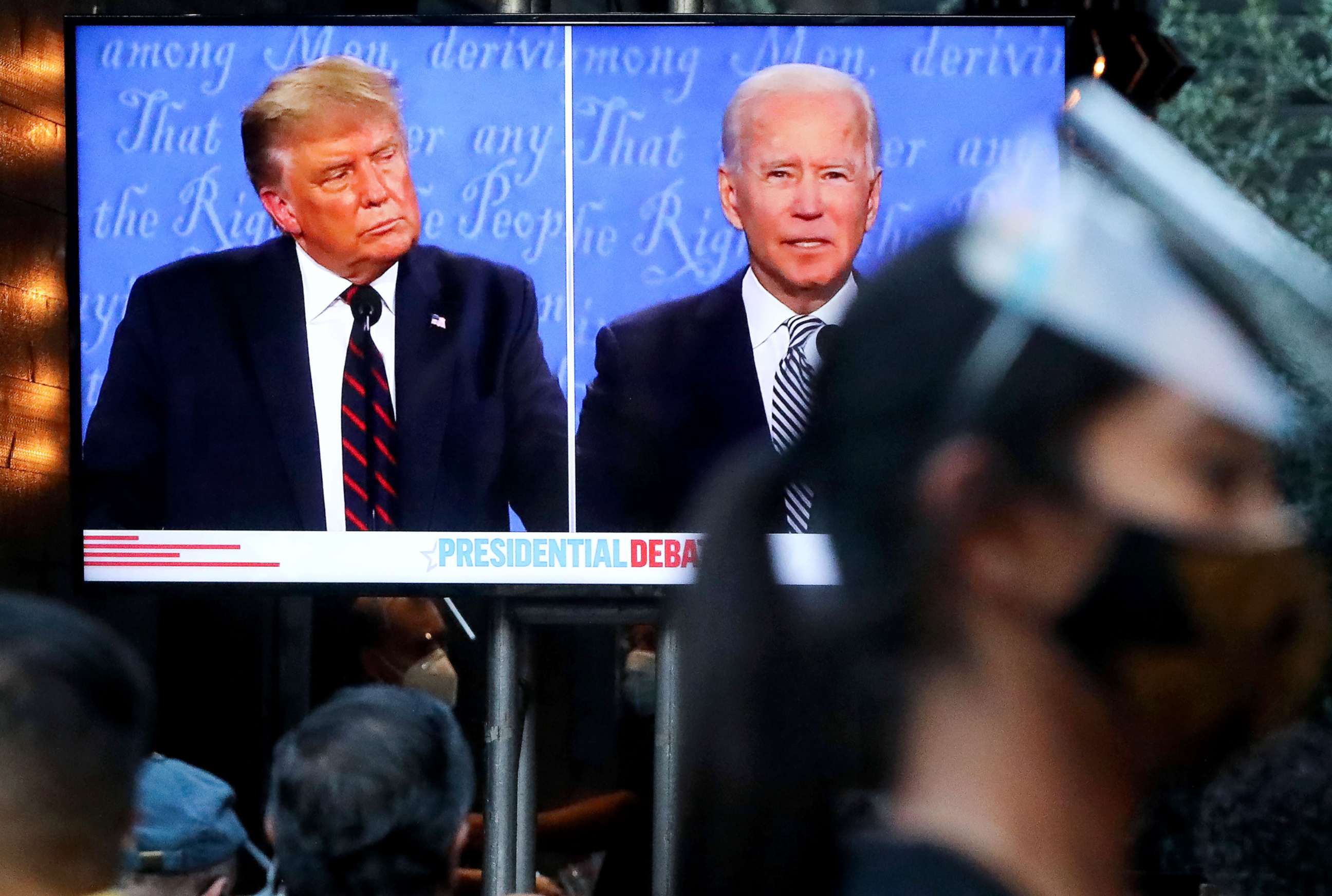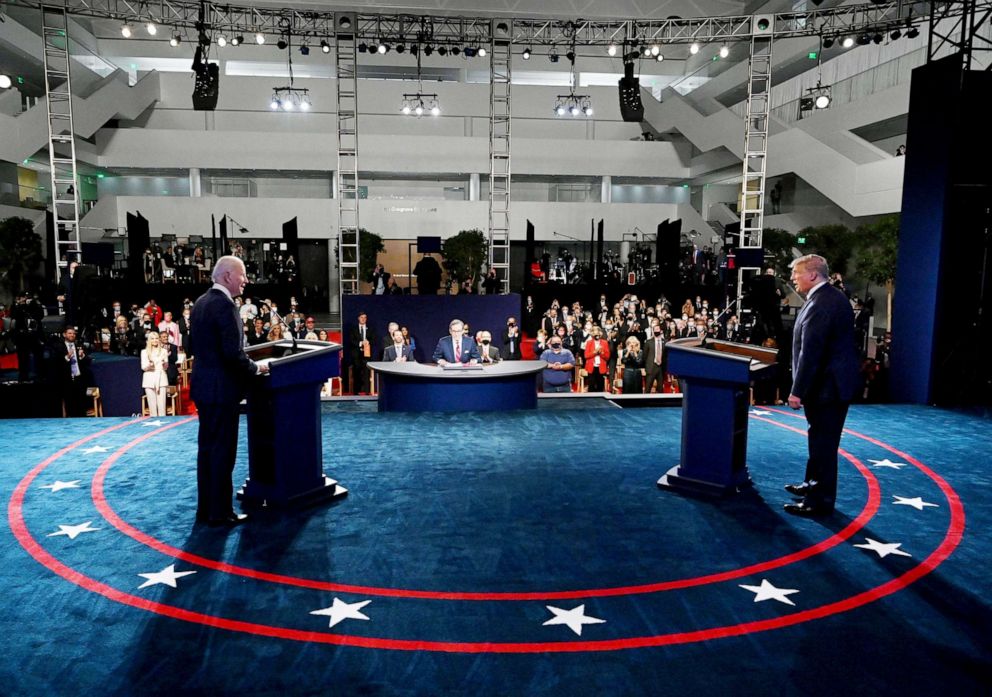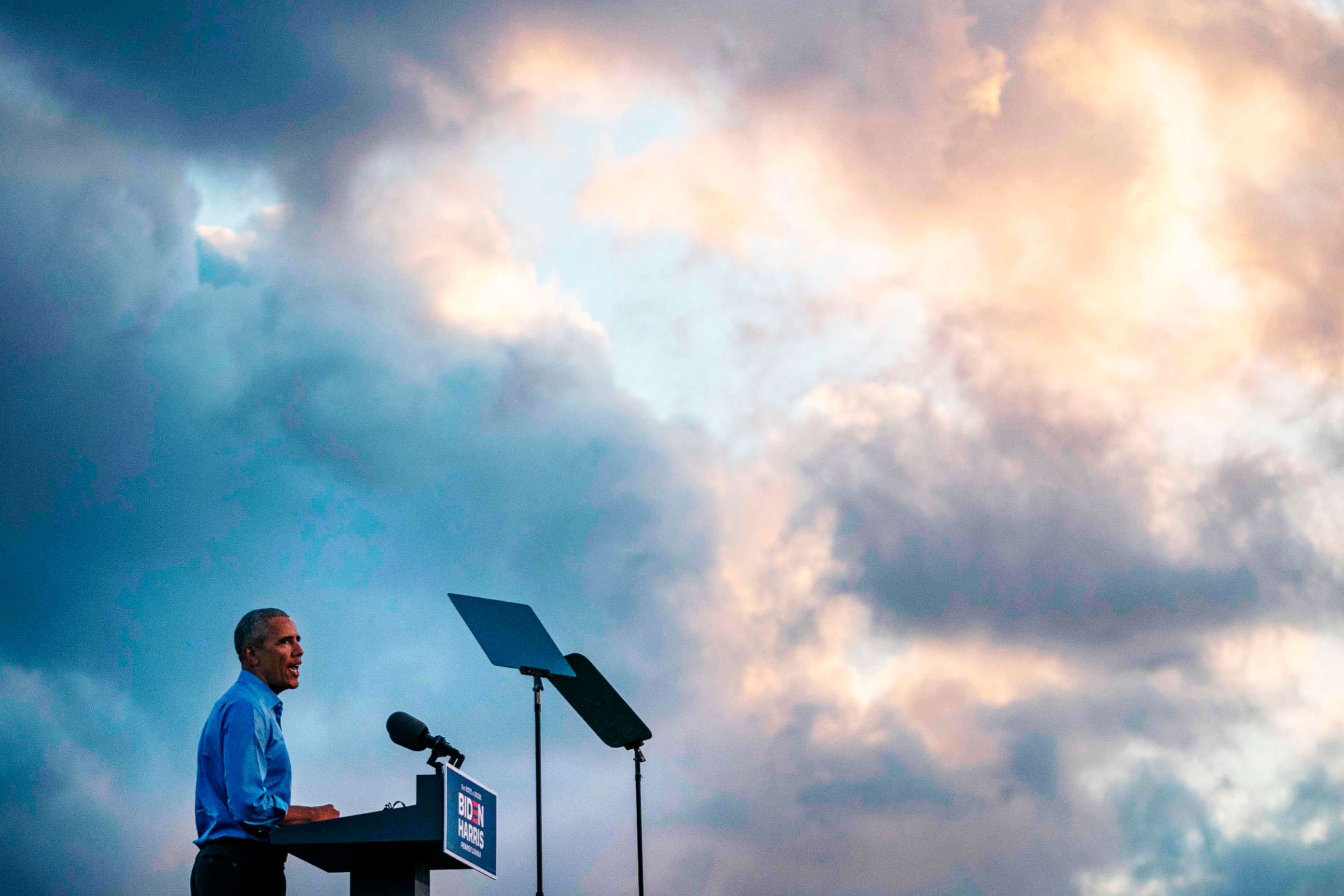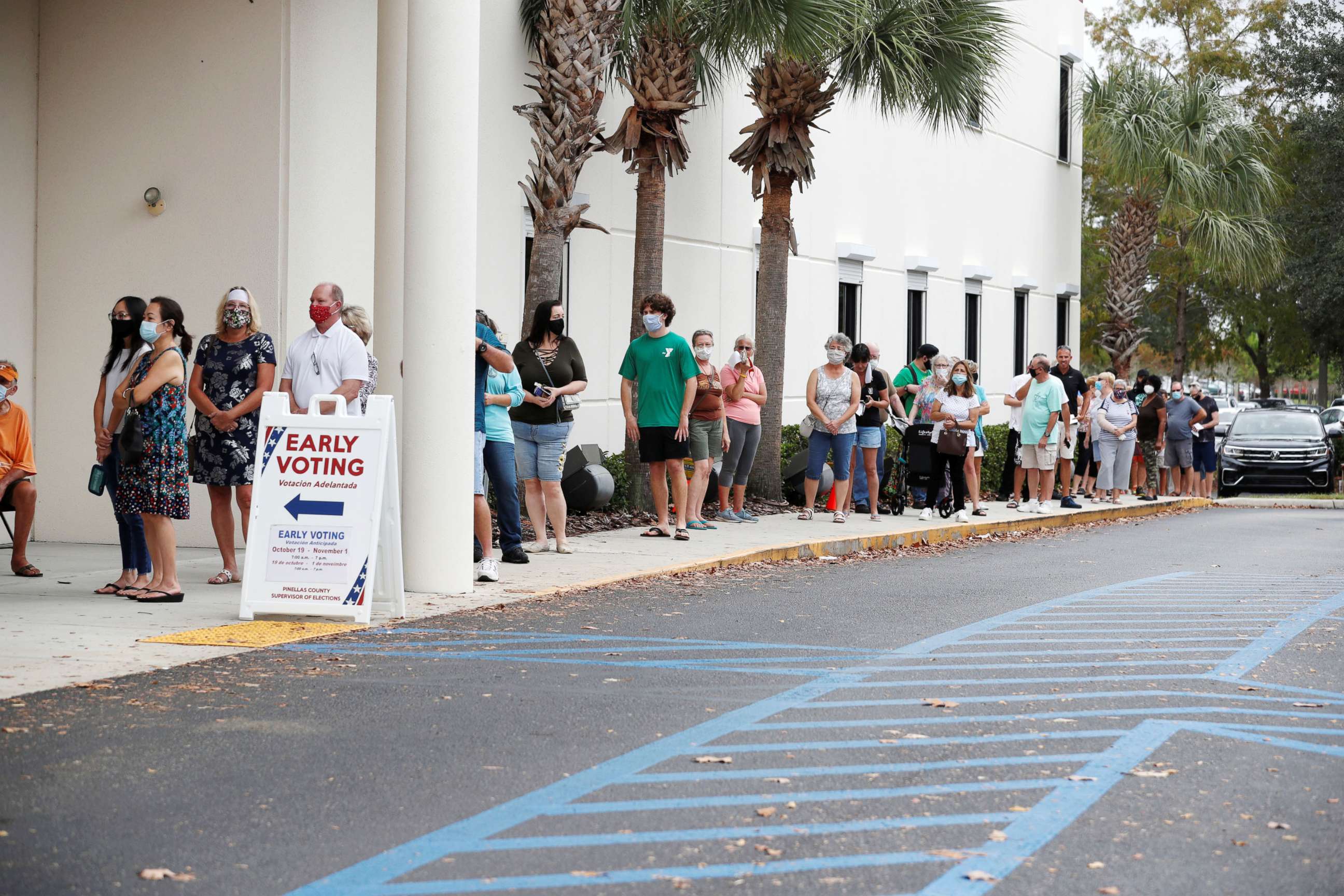The Note: Foreign meddling becomes real on eve of final debate
The question of whether foreign meddling is a threat should finally be settled.
The TAKE with Rick Klein
Just the basics of the announcement -- a sudden FBI and national intelligence briefing, 13 days before the election, the night before the presidential debate -- was enough to spin heads.
And while the stated intention of Wednesday night's surprise news conference was to tell Americans they should be confident their votes will be protected from foreign interference, at least one messenger jumped to politics quickly enough to arouse suspicion.

Director of National Intelligence John Ratcliffe said flatly that Iranian and Russian threats to election security were "designed to intimidate voters, incite social unrest and damage President Trump."
Ratcliffe and FBI Director Christopher Wray didn't explain why they believe Trump to have been a target.
Reports that have emerged out of Florida so far were of foreign actors posing as part of the far-right "Proud Boys" group -- to make threats against Democrats.
Those emails aside, the very knowledge that Russian and Iranian entities are using American voter files to try to influence American voters should settle, finally, the question of whether foreign meddling is a threat.

Federal authorities say they are on the case. But it all tees up a potentially awkward debate topic for a president who hasn't always trusted the word of his agencies.
The RUNDOWN with MaryAlice Parks
At his event in Philadelphia Wednesday night, President Barack Obama said there was a double standard with President Donald Trump.
Referring to reports from The New York Times that Trump owes millions of dollars in debt and allegedly has a bank account in China, Obama said, "They would have called me Beijing Barry. It is not a great idea to have a president who owes a bunch of money to people overseas."

ABC News has not independently confirmed The New York Times reporting on the president's taxes.
The former president blasted his predecessor over his handling of the coronavirus pandemic too.
"The rest of us have had to live with the consequences of him proving himself incapable of taking the job seriously. At least 220,000 Americans have died," he said. "The only people truly better off than they were four years ago are the billionaires who got his tax cuts."
Trump's campaign spokesperson reacted to Obama's presence on the campaign trail before he even took the stage, saying earlier in the day that former Vice President Biden was "not up to the rigors of campaigning" and was calling in "a reinforcement." Biden, of course, will not have reinforcements on the debate stage, but Trump too will not be able to brush aside questions about the pandemic, which continues to kill hundreds of Americans every day.
During a press briefing at the Centers for Disease Control and Prevention in Atlanta, Jay Butler, the agency's deputy director for infectious diseases, said Wednesday, "I recognize that we are all getting tired, the impact that COVID-19 has had on our lives, we'd get tired of wearing masks, but it continues to be as important as it's ever been."
The TIP with Kelsey Walsh
With 12 days until Election Day, some version of early voting has begun in all 50 states plus, Washington, D.C. In the states reporting data, more than 44 million votes have been cast in the 2020 general election. The early voting data continues to hit record numbers across the nation. If the early voting numbers continue to increase at the current rate, the United States will surpass total voter turnout in the 2016 election where 138 million votes were cast.
In a breakdown of the numbers, early voting has increased 10 times compared to 2016. On Oct. 21, 2016, Pew Research Center reported 4.3 million early votes. Voters have cast 30% of the total votes counted in the 2016 general election. Texas leads the nation with the most early votes with at least 5,215,655 ballots returned.

Across the nation this week, there were several impressive single-day increases in early votes. For example, on the first day of in-person voting in Wisconsin, just under 100,000 voters headed to the polls with 79,774 votes cast. On the second day of in-person early voting, Florida had a million-vote increase. In comparison, North Carolina saw an 500,000 in-person early vote increase from day to day. Furthermore, Montana saw 80,000 votes increase in one day. On Tuesday, Montana had 160,000 votes and reported over 240,000 early votes on Wednesday.
According to the U.S. Election project, 19 states provided early voting data by party registration. In these states, 52% of early votes were cast by registered Democrats and 26% of early votes were registered Republicans.
THE PLAYLIST
ABC News' "Start Here" podcast. Thursday morning's episode features a preview of Wednesday night's final presidential debate with ABC News Senior Congressional correspondent Mary Bruce. ABC News Senior Investigative correspondent Aaron Katersky explains how Purdue Pharmaceuticals reached a massive settlement over its marketing of opioids. And ABC News Foreign correspondent James Longman tells us about Pope Francis' landmark statement on same-sex civil unions. http://apple.co/2HPocUL
ABC News' "Powerhouse Politics" podcast. Former national security adviser H.R. McMaster expressed frustration with President Donald Trump's public posture toward Russia, characterizing the commander-in-chief's statements and doubts about the United States' electoral process as "disconnected" from the actions and policies of his administration. McMaster told ABC News Chief White House Correspondent Jonathan Karl and Political Director Rick Klein that he believed the administration "affected the most significant shift in U.S. foreign policy since the end of the Cold War" during his tenure, including "a competitive approach to China rather than a policy of cooperation (and) engagement." https://bit.ly/2w091jE
FiveThirtyEight Politics Podcast. Voting laws and procedures across the country have changed to accommodate mail voting and safe in-person voting during the coronavirus pandemic. As a result, Americans are voting early and by mail more than ever before. The changes have also been accompanied by hundreds of lawsuits at the state and federal levels. In this installment of the FiveThirtyEight Politics podcast, Amelia Thomson-DeVeaux and Nathaniel Rakich break down how the rules have changed, how it’s affecting Americans’ ability to vote and what kinds of arguments are still being hashed out in court. https://apple.co/23r5y7w
WHAT YOU NEED TO KNOW TODAY
- Sen. Elizabeth Warren, D-Mass., joins ABC's "The View."
- At 9 a.m. the Senate Judiciary Committee meets and will vote on the nomination of Judge Amy Coney Barrett to be an associate justice on the Supreme Court of the United States.
- Vice President Mike Pence campaigns in Michigan and Indiana. At 12:30 p.m. he holds a campaign event in Waterford, Michigan. Later, he travels to Fort Wayne, Indiana, to hold another campaign event at 4:30 p.m.
- President Donald Trump and first lady Melania Trump travel to Tennessee. At 3 p.m., the president participates in a roundtable with supporters at the JW Marriott Nashville. Later, the president and first lady travel to Belmont University for the presidential debate at 9 p.m.
- Sen. Kamala Harris holds a virtual campaign rally at 4:30 p.m.
- Former Vice President Joe Biden travels to Nashville for the presidential debate at 9 p.m.
- ABC News will have three hours of special primetime coverage Thursday night ahead of the presidential debate. There will be a one-hour primetime special, "Trump vs. Biden: The Final Presidential Debate" that kicks off at 8 p.m. ABC News Live's streaming coverage begins at 7 p.m. and then will simulcast ABC's coverage and the debate.
Download the ABC News app and select "The Note" as an item of interest to receive the day's sharpest political analysis.
The Note is a daily ABC News feature that highlights the key political moments of the day ahead. Please check back tomorrow for the latest.




